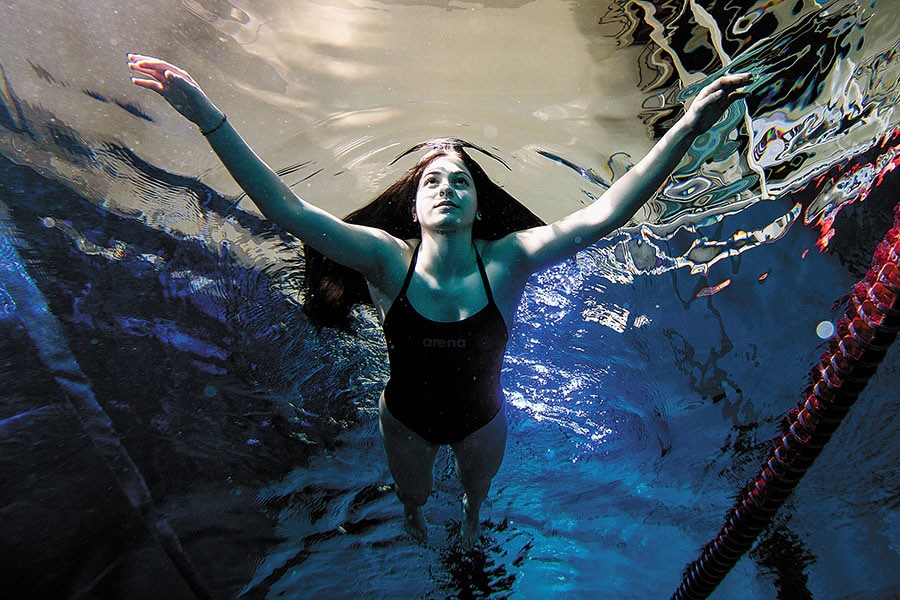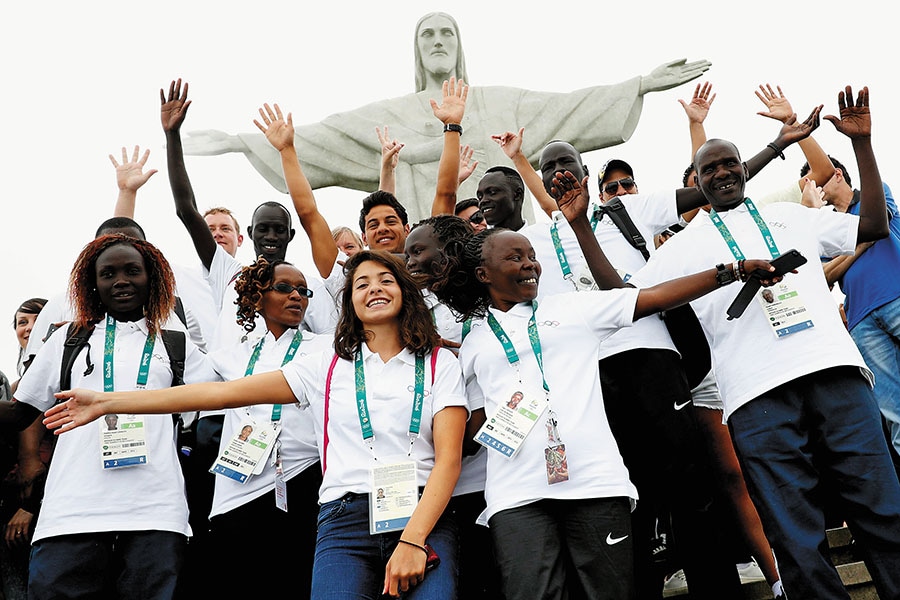Yusra Mardini: From war-torn Syria to the Olympics—redefining the concept of win
22-year-old Mardini's escape from war-torn Syria led her to the Olympics, taught her to embrace the word 'refugee', and changed her concept of what winning really means



Yusra Mardini of Syria during a training session at the Wasserfreunde Spandau 04 training pool Olympiapark Berlin on March 9, 2016 in Berlin, Germany. (Photo by Alexander Hassenstein/Getty Images for IOC) [br]
“I think no one should ever be sent back to war.”
When Yusra Mardini utters these words, the smile leaves her face for the first time during our conversation. Until then, the 22-year-old has oscillated between personable and vivacious. Despite the fact that we’re separated by a screen—she’s speaking to me via video call from her home in Hamburg, Germany—her energy has the ability to make me forget that we’re not in the same room. No answer is delivered without a few cheerful and enthusiastic gestures. And there’s an incredible sense of clarity and conviction in everything she says—her words carry a weight of wisdom unusual for someone so young. It’s only in that one moment devoid of conviviality that I’m reminded of just how harrowing her life had been a few years ago.
“At the back of my mind, I knew that I could swim it. But the other people on the boat couldn’t,” Mardini says, thinking back six years.
In August 2015, Yusra and her older sister Sarah were in a crowded rubber boat that was cutting through the treacherous waters between Turkey and Greece. It was just one leg of the perilous journey from their hometown of Damascus, Syria—by then ravaged by a multi-sided civil war—to Germany, where they hoped to seek refuge. When the boat’s engine suddenly gave up, and the possibility of capsizing seemed real, it became clear to both girls that they had to try swimming. It was the only way to ensure the safety of the 18 other passengers on board.
Hailing from a family of swimmers, the Mardini sisters weren’t fazed. After all, they had been swimming for as long as they could remember, guided through a rigorous training regimen by their father Ezzat. The goal, for Yusra especially, had always been to make it to the Olympics. In order to have a fighting chance at that goal, and at life itself, the sisters now did what they had to do. Sarah dove into the biting cold water, followed quickly by Yusra. Together they partly paddled, partly clung onto the boat, braving the waves and the icy black sea. Eventually, two others from the boat joined them in their struggle to keep everyone afloat. Three-and-a-half hours later, the boat scraped against the shores of Lesbos in Greece.

Yusra Mardini and her sister Sarah were travelling on a rubber boat fleeing war-torn Syria, when the engine failed. When the fear of capsizing became real, the sisters dove into the cold water, partly paddled and partly clung on to the boat while guiding others to safety. Esteban Martinena/Anadolu Agency/Getty Images [br]
The torturous journey continued, taking them to Serbia, Hungary, Austria and Germany. They arrived at a refugee camp in Berlin, 25 days after leaving home. Miraculously, just some weeks later, the sisters managed to impress Sven Spannekrebs, the coach of a local swimming club called Wasserfreunde Spandau 04, enough for him to agree to train them. And in August 2016, just one year after leaving Syria, Yusra found herself greeted by rousing cheers at the Olympic stadium in Rio de Janeiro.
“What I’ve learnt from my whole journey is that giving up isn’t an option,” says Yusra. Of course, she is speaking of her journey in its entirety. A journey that included a year of rebellion during which she gave up swimming, cut her hair short, began using makeup, and prioritised a social life above all else. On the face of it, it might seem like fairly typical teenage behaviour. But when contrasted with the war in Syria, and her own determination to represent her country at the Olympics, the defiance was uncharacteristic. But Yusra now views it as a critical part of her past, not only because, “It’s always fun to be crazy once in a while,” but also because it taught her just how important swimming was to her.
Until then, a part of her had believed she was fulfilling her father’s dream. But the year away from the sport helped put life into perspective. The point—that without swimming she really was a fish out of water—was driven home when she saw a photo of the Syrian national swim team all smiles after winning a bronze medal at an international meet. It was like a punch to the gut. “I understood what swimming really means to me. I realised that I really had a passion for the sport, and it wasn’t just that I was a swimmer because of my dad. In a way I’m grateful for that crazy year,” she says. The next day she was back at the pool, training. However, the worsening conditions in Syria made it clear that her Olympic dreams would only come true if she found a way to get to safety. The boat and the open water were a challenging means to a necessary end. The real struggle came after.

Motaseem Rashed/Anadolu Agency/Getty Images [br]
“When I first came to Germany, I was really, really ashamed of the word ‘refugee’. I was sad and thought people would think I was poor or stupid or that I just came here to get money or opportunities,” she says. This was a departure from the pride and quiet dignity with which the family had lived their old life in Damascus. In 2015, with an influx of refugees to Europe, the atmosphere was rife with mistrust and xenophobia, understandably hard for a teenager who had seen the city she had grown up in razed to the ground and friends perish because of the war. What was just as hard was having to rely on the kindness of strangers, which oftentimes felt like charity.
Then there was the fact that the year away from swimming had set her back. The competitive Yusra—who at one point says, “If you don’t want to be the best, then how will you be the best?”—was unhappy with her performance in the pool. It was during this period of inner turmoil that she got the opportunity to compete in the 2016 Olympics, representing the Refugee Olympic Team. Her misgivings proved to be temporary.
“Everything changed when I entered the stadium at Rio, to be honest,” says Yusra. Being part of the Olympic opening ceremony, along with nine other athletes from around the world, who were similarly displaced, flipped a switch in her head. She realised that it wasn’t just about her any longer, nor was it about the timings she set in the pool. “At that moment I told myself, ‘Nope, stop thinking about yourself’.” She realised, “It’s about the community that I’m fighting for. It’s about refugees. It’s about athletes. It’s about swimmers. It’s about being a voice for people who don’t have a voice.” Her ebullient nature led to the media dubbing her the “face” of the Refugee Team and she found herself slowly embracing the term. “I am really proud of that, and I wish and hope that I always represent refugees in a good way. And I will always fight for them,” she says.

Members of the Refugee Olympic Team, including Mardini. Kai Pfaffenbach / Reuters [br]
That the Rio Olympics had a profound effect on Yusra is evident. There was the realisation that “Winning is not just a gold medal, it can be many other things,” she says. “I didn’t win at the Olympics, but I still won. I gave people hope. My team gave people hope,” she says, a broad grin on her face. And it’s this very message of hope that Yusra represents in her role as UNHCR Goodwill Ambassador. Run a Google image search for her and you’ll find, amongst many photos of her swimming, pictures of her deep in conversation with Barack Obama, presenting the BAMBI award to Pope Francis, receiving the BAMBI award alongside her sister Sarah for being ‘Unsung Heroes’, flashing the victory symbol alongside Emma Watson, and standing next to Queen Rania of Jordan. Being a Goodwill Ambassador allows her to share her story and also highlight the fact that hers is just one among many such stories.
According to the UNHCR website, “At least 79.5 million people around the world have been forced to flee their homes. Among them are nearly 26 million refugees.” Yusra also spends time visiting refugees at camps, trying to boost their morale. She is the living, breathing embodiment of hope.
That isn’t to say that her competitive streak has in any way diminished. If anything, the 2016 Olympic experience only served to make Yusra even more determined to qualify for the 2021 Olympics in Tokyo, and this time she plans to be in better form than before. After a four-week gap during the first Covid-19 lockdown in Germany, she returned to her training schedule, which involves 10 to 11 sessions a week, each lasting between two and two-and-a-two-and-a-half hours. But she still carries the lessons from Rio within her. Back in 2016, despite winning the 100 m butterfly event, her timing of 1:09.21 meant that she was ranked 41st overall and could not advance to the semi-finals. She was so unhappy with her performance that she didn’t want to collect her medal, though she eventually did. Now, she laughs at the memory, acknowledging that it was poor form on her part. “I’m still competitive, but I know winning isn’t everything now. And I know that if I’ve given everything for my dream, and I haven’t achieved it yet, it will still happen. Maybe I need to be patient. Maybe I need to do things differently. Maybe I need to try not to be as hard as before.”

Sven Spanne-krebs, Mardini’s first coach in Germany, with the swimmer. Alexander Hassenstein/Getty [br] Images for IOC
And even as Yusra trains for the Olympics, with Europe engulfed in a bitter winter, she’s worried about more than just her own ambitions. “Refugees are still in the camps. They have to deal with Covid, they have to deal with the winter, they have to deal with a shared bathroom for thousands of people,” she says. “It’s really tough and someone has to tell people what’s happening. Someone has to tell people to wake up and that it’s not always about you. I always tell people, it’s about all of us, and that it is not only when you experience this situation you have to start thinking about it. There are still refugees out there who are stuck at the borders, they don’t have enough food, they don’t have any health care, they don’t have access to their basic human rights… I sometimes feel guilty that I have a normal life and they are still stuck there.
”There’s also the fact that as of December 31, 2020, Germany’s ban on deportation of Syrian nationals has ended. The Geneva Convention stipulates that people who are deemed to be ‘dangerous’ to the local community can be sent back to a war-torn nation. But what constitutes ‘dangerous’, and whether anyone with a criminal record can be deported, is unclear. For Yusra this is worrying because in 2018 her sister Sarah was arrested after volunteering as a rescue swimmer in Greece. Her crime? Trying to prevent refugees from drowning at sea. After 107 days in a Greek prison, she was granted bail. Sarah lives in Berlin with their father, mother Mervat, and younger sister Shahed. “My sister was in jail because she was helping refugees, so will the government count this as having a criminal background?” she wonders. “I think no one should ever be sent back to war.”

Yusra (L) and Sarah won the BAMBI award for being ‘Unsung Heroes’ in 2016. Fabrizio Bensch / Reuters [br]
In 2018, in a bid to get her story and her voice to reach more people, Yusra published her biography titled Butterfly: From Refugee to Olympian—My Story of Rescue, Hope, and Triumph. She’s since rethought a part of that title. “I am not a refugee or an Olympian. I am both,” she says firmly. “Being a refugee made me realise that being a human and having empathy for other people, and being there for other people is more important than being a swimmer. So, I am human, I am female, and then I am a swimmer,” she says. Proof of the fact that you don’t always need to be forged in fire to emerge stronger. Sometimes what it takes is a 10 km stretch of cold, open water.
First Published: Feb 20, 2021, 10:35
Subscribe Now